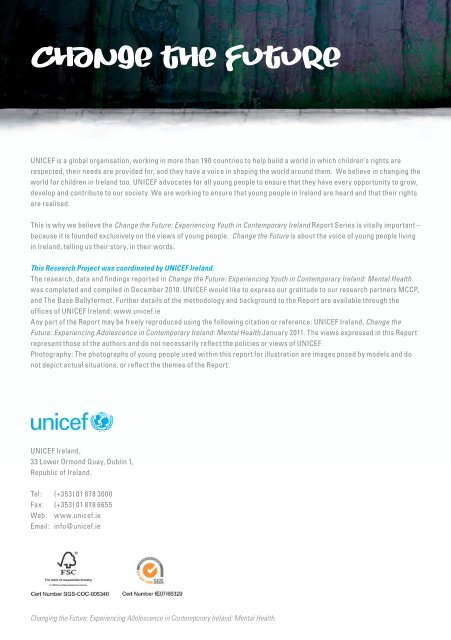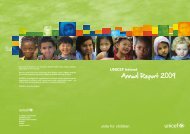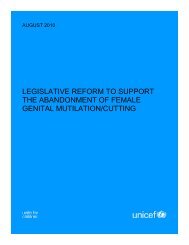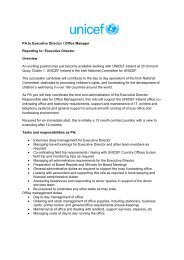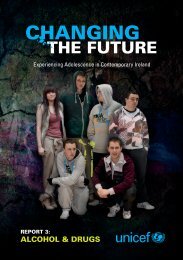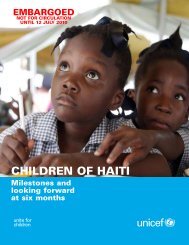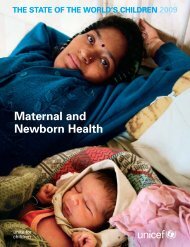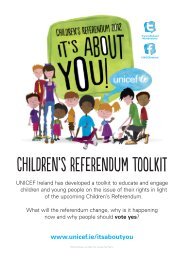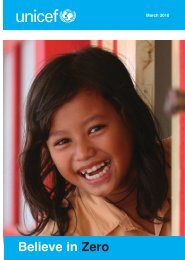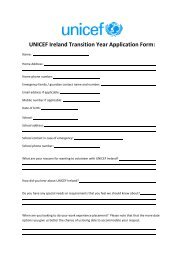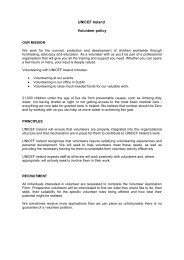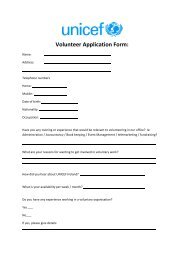Change the Future - UNICEF Ireland
Change the Future - UNICEF Ireland
Change the Future - UNICEF Ireland
Create successful ePaper yourself
Turn your PDF publications into a flip-book with our unique Google optimized e-Paper software.
<strong>Change</strong> <strong>the</strong> future<br />
<strong>UNICEF</strong> is a global organisation, working in more than 190 countries to help build a world in which children’s rights are<br />
respected, <strong>the</strong>ir needs are provided for, and <strong>the</strong>y have a voice in shaping <strong>the</strong> world around <strong>the</strong>m. We believe in changing <strong>the</strong><br />
world for children in <strong>Ireland</strong> too. <strong>UNICEF</strong> advocates for all young people to ensure that <strong>the</strong>y have every opportunity to grow,<br />
develop and contribute to our society. We are working to ensure that young people in <strong>Ireland</strong> are heard and that <strong>the</strong>ir rights<br />
are realised.<br />
This is why we believe <strong>the</strong> <strong>Change</strong> <strong>the</strong> <strong>Future</strong>: Experiencing Youth in Contemporary <strong>Ireland</strong> Report Series is vitally important –<br />
because it is founded exclusively on <strong>the</strong> views of young people. <strong>Change</strong> <strong>the</strong> <strong>Future</strong> is about <strong>the</strong> voice of young people living<br />
in <strong>Ireland</strong>, telling us <strong>the</strong>ir story, in <strong>the</strong>ir words.<br />
This Research Project was coordinated by <strong>UNICEF</strong> <strong>Ireland</strong>.<br />
The research, data and findings reported in <strong>Change</strong> <strong>the</strong> <strong>Future</strong>: Experiencing Youth in Contemporary <strong>Ireland</strong>: Mental Health<br />
was completed and compiled in December 2010. <strong>UNICEF</strong> would like to express our gratitude to our research partners MCCP,<br />
and The Base Ballyfermot. Fur<strong>the</strong>r details of <strong>the</strong> methodology and background to <strong>the</strong> Report are available through <strong>the</strong><br />
offices of <strong>UNICEF</strong> <strong>Ireland</strong>: www.unicef.ie<br />
Any part of <strong>the</strong> Report may be freely reproduced using <strong>the</strong> following citation or reference: <strong>UNICEF</strong> <strong>Ireland</strong>, <strong>Change</strong> <strong>the</strong><br />
<strong>Future</strong>: Experiencing Adolescence in Contemporary <strong>Ireland</strong>: Mental Health January 2011. The views expressed in this Report<br />
represent those of <strong>the</strong> authors and do not necessarily reflect <strong>the</strong> policies or views of <strong>UNICEF</strong>.<br />
Photography: The photographs of young people used within this report for illustration are images posed by models and do<br />
not depict actual situations, or reflect <strong>the</strong> <strong>the</strong>mes of <strong>the</strong> Report.<br />
<strong>UNICEF</strong> <strong>Ireland</strong>,<br />
33 Lower Ormond Quay, Dublin 1,<br />
Republic of <strong>Ireland</strong>.<br />
Tel: (+353) 01 878 3000<br />
Fax: (+353) 01 878 6655<br />
Web: www.unicef.ie<br />
Email: info@unicef.ie<br />
As <strong>the</strong> Changing <strong>the</strong> <strong>Future</strong> Report Series continues, this<br />
second report focuses on adolescent experiences of<br />
mental health, and <strong>the</strong> associated issues and pressures to<br />
which young people are being exposed.<br />
There are many disturbing and heart breaking findings<br />
in this report. The pain that many young people are<br />
experiencing was very evident not only in <strong>the</strong> statistics<br />
but also in <strong>the</strong> comments made by <strong>the</strong> many brave, young<br />
people who took part in this survey. Our findings show<br />
that many young people experience serious mental health<br />
issues at some stage. Yet very few of <strong>the</strong>m receive any<br />
professional help and as a result many experience ongoing<br />
problems.<br />
Young people have <strong>the</strong> capacity to help us reach <strong>the</strong><br />
solutions to <strong>the</strong>se challenges. Through <strong>the</strong>ir compassion,<br />
determination and kindness young people all across<br />
<strong>Ireland</strong> continue to reach out to peers experiencing<br />
difficulty every day. The young people who chose to take<br />
part in this Research continue this tradition, by sharing<br />
<strong>the</strong>ir stories with <strong>UNICEF</strong>, <strong>the</strong>y are ensuring that we can<br />
act to support young people who we know may come to<br />
experience those same challenges in <strong>the</strong> future.<br />
It is crucial that all of us in <strong>Ireland</strong> break down <strong>the</strong><br />
stigmas and taboos that surround adolescent mental<br />
health. Confronting <strong>the</strong>se issues is <strong>the</strong> first step towards<br />
promoting and ensuring positive mental health for<br />
all young people, and supporting and assisting those<br />
young people who experience difficulties, to return to<br />
equilibrium as quickly and conclusively as possible.<br />
As a society we must all ask serious questions about our<br />
ability to reach out to young people who are experiencing<br />
<strong>the</strong>se difficulties. We must question <strong>the</strong> quality of our<br />
efforts to offer support to young people in crisis.<br />
We must strive to ensure that every single young person<br />
who needs our companionship, our understanding and<br />
our assistance knows that we are here for <strong>the</strong>m, and<br />
knows <strong>the</strong> avenues through which <strong>the</strong>y can draw down<br />
that support, in a safe, protective, confidential and nonjudgemental<br />
way.<br />
The right to good health, both physical and mental is not<br />
something that young people in <strong>Ireland</strong> should have to<br />
aspire to. It is something to which <strong>the</strong>y are entitled, and<br />
which we are beholden to secure on <strong>the</strong>ir behalf.<br />
We must do more to ensure that when it comes to positive<br />
mental health, our children know that <strong>the</strong>y have nothing to<br />
hide, that <strong>the</strong>re are sympa<strong>the</strong>tic and supportive avenues<br />
to which <strong>the</strong>y can turn, that <strong>the</strong>y no child has to face <strong>the</strong>se<br />
challenges alone.<br />
Melanie Verwoerd<br />
Executive Director, <strong>UNICEF</strong> <strong>Ireland</strong>.<br />
Changing <strong>the</strong> <strong>Future</strong>: Experiencing Adolescence in Contemporary <strong>Ireland</strong>: Mental Health. <strong>UNICEF</strong> Changing <strong>the</strong> <strong>Future</strong> 3.


